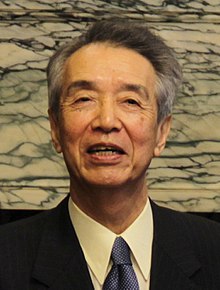Bunmei Ibuki

26 December 2012 – 21 November 2014
2 August 2008 – 24 September 2008
26 September 2006 – 26 September 2007
19 December 1983 – 14 October 2021
(1983-1996)
Kinki PR block
(2009-2012)
Kyoto 1st
(1996-2009)
(2012-2021)
Kyoto, Empire of Japan


Bunmei Ibuki (伊吹 文明, Ibuki Bunmei, born 9 January 1938)[1] is a Japanese politician.
He was born in Kyoto to a family of textile wholesalers who had operated the business since the Edo period. He graduated with a BA from Kyoto University's economics department in 1960. At Kyoto University he was a member of the tennis club. Upon graduation Ibuki became a bureaucrat at the Ministry of Finance. He was dispatched to the Japanese embassy in London in 1965, where he stayed for four years.[2]
Ibuki entered politics in 1983 at former Finance Minister Michio Watanabe's behest. He is a member of the Liberal Democratic Party (LDP) and has served in a variety of government positions, including Minister of Labour (1997~98) and National Public Safety Commission chairman (2000~01).[citation needed]
He was appointed Minister of Education, Culture, Sports, Science and Technology on 26 September 2006 as a part of Prime Minister Shinzō Abe's first cabinet. In this position, he promoted the controversial revision of the Fundamental Law of Education. He was subsequently appointed as Secretary-General of the LDP in September 2007;[3] less than a year later, he was replaced in that position by Taro Aso and was instead appointed as Minister of Finance.[4] He is known for his knowledge of finance and tax and welfare policies.[5] He held the post of Finance Minister for less than two months, however, and was replaced by Shōichi Nakagawa in the Cabinet of Prime Minister Taro Aso, appointed on 24 September 2008.[6]
On 26 December 2012, Bunmei Ibuki was elected Speaker of the House of Representatives of Japan. He presided over the day of his inauguration, the election of Prime Minister Shinzō Abe.[citation needed]
Personal life
- Ibuki is a fluent English speaker[5] and a believer of Tenrikyo.[7] He is a member of the openly revisionist lobby Nippon Kaigi,[8] and affiliated to the fundamentalist shinto lobby Shinto Seiji Renmei Kokkai Giin Kondankai (神道政治連盟国会議員懇談会).
- Ibuki is nicknamed "Ibu-King" due to his enduring political influence despite his now-advanced age.
Honours
 Japan: Grand Cordon of the Order of the Paulownia Flowers (29 April 2022)[9]
Japan: Grand Cordon of the Order of the Paulownia Flowers (29 April 2022)[9] Netherlands: Knight Grand Cross of the Order of Orange-Nassau (29 October 2014)[10]
Netherlands: Knight Grand Cross of the Order of Orange-Nassau (29 October 2014)[10]
References
- ^ Prime Minister of Japan official website - "Minister of Education, Culture, Sports, Science and Technology", retrieved 24 September 2007.
- ^ Ibuki official website; accessed 24 September 2007. (in Japanese)
- ^ "Fukuda appoints Ibuki as secretary-general, Tanigaki as policy chief"[permanent dead link], Mainichi Daily News, 24 September 2007.
- ^ "Fukuda overhauls Cabinet / LDP executive shakeup also elevates Aso to party No. 2" Archived 2008-10-16 at archive.today, The Yomiuri Shimbun, 2 August 2008.
- ^ a b Japan Times, "Fukuda's new lineup", 3 August 2008.
- ^ "Aso elected premier / Announces Cabinet lineup himself; poll likely on Nov. 2" Archived 2008-09-28 at the Wayback Machine, The Yomiuri Shimbun, 25 September 2008.
- ^ "6閣僚に「9条守れ」/天理教平和の会、信者に要請".
- ^ Nippon Kaigi website - 5 years: nipponkaigi.org/voice/5years - 10 years: nipponkaigi.org/about/10years
- ^ 皇居で春の大綬章親授式 伊吹元衆院議長ら18人 (Spring Grand Ribbon Ceremony at the Imperial Palace, Former Speaker of the House of Representatives Ibuki and 18 others) - website of Japanese newspaper Sankei Shimbun
- ^ Decoraties Staatsbezoeken Japan en Republiek Korea Archived 2014-11-04 at the Wayback Machine - website of the Dutch Royal House
External links
- Discussions on Japanese politics and education (Streaming and mp3)
| Political offices | ||
|---|---|---|
| Preceded by Yutaka Okano | Minister of Labour 1997–1998 | Succeeded by |
| Preceded by Osamu Nishida | Chairman of the National Public Safety Commission 2000–2001 | Succeeded by |
| New title | Minister of State for Disaster Management 2001 | |
| Preceded by | Minister of Education, Culture, Sports, Science and Technology 2006–2007 | Succeeded by |
| Preceded by | Minister of Finance 2008 | Succeeded by |
| Preceded by | Speaker of the House of Representatives of Japan 2012–2014 | Succeeded by |
| Party political offices | ||
| Preceded by | Secretary General of the Liberal Democratic Party 2007–2008 | Succeeded by |
- v
- t
- e
under the Daijōkan system of the Meiji Government
under the Constitution of the Empire of Japan
- Matsukata
- Watanabe
- Matsukata
- Watanabe
- Matsukata
- Inoue
- Matsuda
- Matsukata
- Watanabe
- Saionji
- Sone
- Sakatani
- Matsuda
- Katsura
- Yamamoto
- Wakatsuki
- Takahashi
- Wakatsuki
- Taketomi
- Terauchi
- Shōda
- Takahashi
- Ichiki
- Inoue
- Shōda
- Hamaguchi
- Hayami
- Naoharu
- Takahashi
- Mitsuchi
- Inoue
- Takahashi
- Fujii
- Takahashi
- Machida
- Baba
- Yūki
- Kaya
- Ikeda
- Ishiwata
- Aoki
- Sakurauchi
- Kawada
- Ogura
- Kaya
- Ishiwata
- Tsushima
- Hirose
- Tsushima
- Shibusawa
- Ishibashi
under the Constitution of Japan
- Katayama
- Yano
- Kurusu
- Kitamura
- Yoshida
- Izumiyama
- Ōya
- Ikeda
- Mukai
- Ogasawara
- Ichimanda
- Ikeda
- Ichimanda
- Satō
- Mizuta
- Tanaka
- Fukuda
- Mizuta
- Fukuda
- Mizuta
- Ueki
- Aichi
- Tanaka
- Fukuda
- Ōhira
- Bō
- Murayama
- Kaneko
- Takeshita
- Watanabe
- Takeshita
- Miyazawa
- Takeshita
- Murayama
- Hashimoto
- Kaifu
- Hata
- Hayashi
- Fujii
- Takemura
- Kubo
- Mitsuzuka
- Matsunaga
- Miyazawa














